All Forum Posts by: Eric Fernwood
Eric Fernwood has started 64 posts and replied 793 times.
 Post: Should I Buy My First Rental Property Out-of-State If I'm Unable to Scout the Area?
Post: Should I Buy My First Rental Property Out-of-State If I'm Unable to Scout the Area?
- Realtor
- Las Vegas, NV
- Posts 824
- Votes 1,574
Hello @Diana Teng,
If you choose a city that meets the financial independence requirements and work with an experienced local team, you should be OK.
The goal of real estate investing is financial independence. Financial independence requires more than just replacing your current income. Financial independence requires an income that:
- Increases faster than inflation. If rents don't increase faster than inflation, you won't have sufficient funds to cope with rising costs. Your only option will be to find a job to supplement your diminishing ability to sustain your standard of living.
- The income must last throughout your lifetime. Tenants can only pay rent if they are employed at similar wages. However, non-government employers on average last less than 20 years. So, every non-government job your tenants have will vanish in the foreseeable future. Unless new companies move into the city and create replacement jobs, all that will remain are lower-paying service sector jobs. Without replacement jobs, city incomes decline, forcing cities to cut back on services like schools and police. The result is outward population migration and rising crime. Companies are unlikely to choose high-crime cities with declining populations to set up new operations.
- You will need income from multiple properties to replace your current income. The amount of capital required from your savings to purchase multiple properties depends on the appreciation rates. In areas with rapid and sustained appreciation, you can use the equity gained through appreciation to purchase additional properties. However, in areas with little appreciation, all investment capital must come from your savings.
Summarizing, a city where you can achieve and sustain financial independence must have the following characteristics:
- Significant and sustained population growth.
- A pro-business environment with a metro population >1M.
- Rapid and sustained appreciation.
If a city doesn't meet all these requirements, achieving and maintaining financial independence will be difficult. The chances that you currently live in a city meeting all these criteria are low. Therefore, remote investing is your only option if you do not live in a city that meets all these requirements.
Regarding your concern about not being able to visit the city: You likely won't discover much more during a week-long visit than what you can learn from the internet in a few hours. Additionally, your personal feelings about an area or property are irrelevant. All that matters is whether the property will attract reliable tenants (A reliable tenant stays many years, pays the rent on schedule, and takes good care of the property). Such insight can be obtained from an experienced local team.
In addition to the city meeting the requirements I listed, you must work with an experienced investment team. Everything you learn from books, podcasts, seminars, and websites is general information. You will buy a specific property, in a specific location, in a specific city subject to specific local rules and regulations. The only source for the information and services you need is a local investment team.
Can you buy a good property without physically seeing it? Yes, you can. Many of our clients, including myself, have done that. However, you must have your team physically evaluate the property for you.
Hope this helps. Let me know if you want to know more about choosing an experienced local team or an investment city.
 Post: Las Vegas Real Estate Investment Update - 2025 Outlook
Post: Las Vegas Real Estate Investment Update - 2025 Outlook
- Realtor
- Las Vegas, NV
- Posts 824
- Votes 1,574
I hope you are having a great start to the new year.
Every January, we publish our Las Vegas investment outlook for the upcoming year. While predicting the future is challenging (and foolish)—factors like inflation, economic performance (potential chaos caused by tariffs, if they all come through), interest rates, geopolitical events, and unexpected developments affect the market—forecasts remain helpful tools for investment planning. At the very minimum, they help us consider possibilities.
I will start by reviewing what happened in 2024.
Looking Back at 2024The following charts only apply to the property profile we target:
- Type: Single-family
- Configuration: 3+ bedrooms, 2+ baths, 2+ car garages, 1,100 to 2,400 SF, one or two stories, lot size 3,000 SF to 6,000 SF.
- Rent range: $1,900/Mo to $2,300/Mo
- Location: See the map below for the general areas.
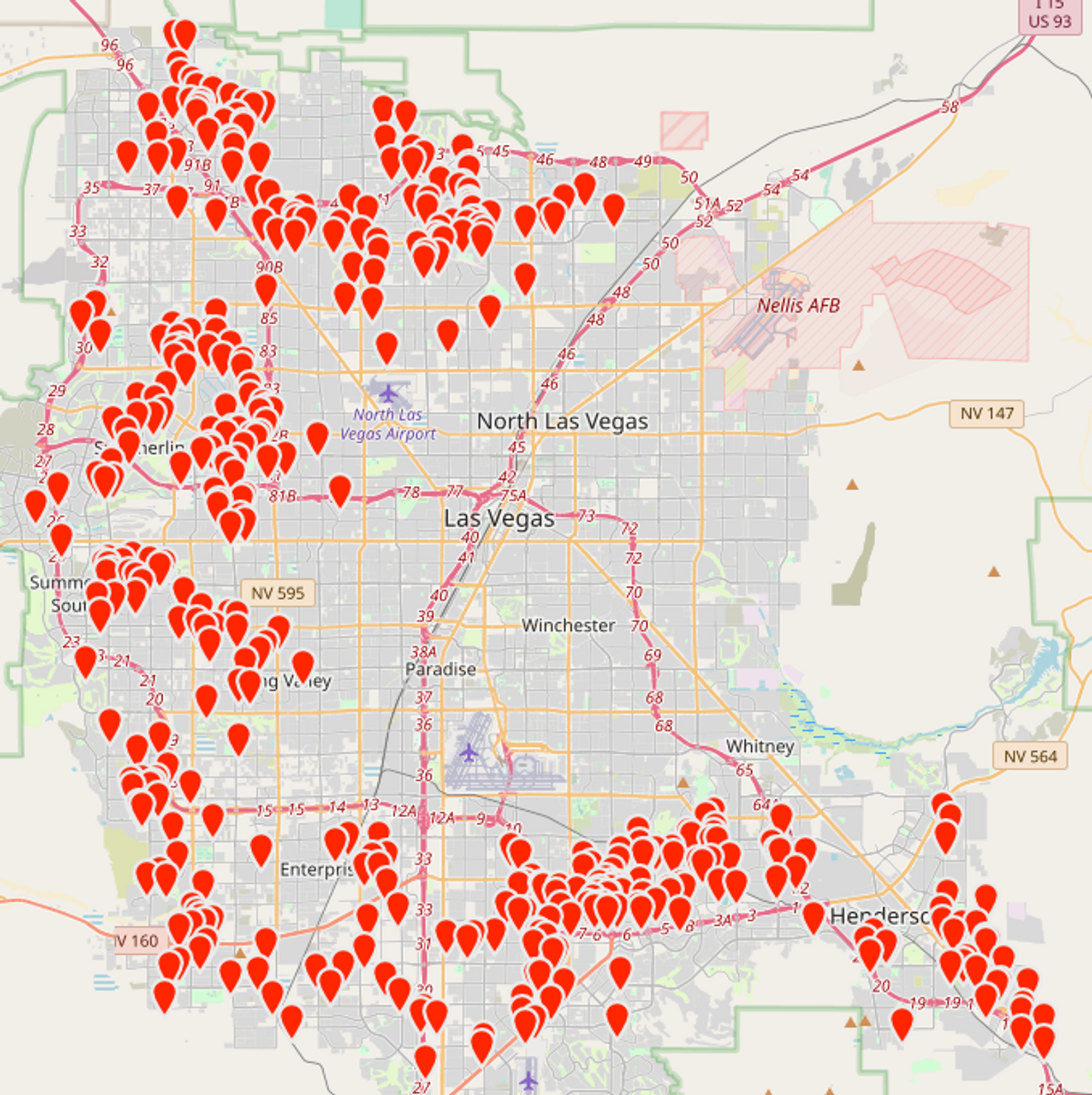 Prices
Prices
Sales - $/SqFt by Month
A December 2024 price decline and an unusual price spike in December 2023 (caused by lower interest rates) resulted in a 3.7% year-over-year growth. In November, the year-over-year growth was 7.6%, better representing the 2024 trend.

Sales - List to Contract Days by Month
The average days on the market stayed under 25 days, except for November and December, which are traditionally slow periods for the housing market.

Sales - Months of Supply by Month
Inventory remained between 1 and 2 months in 2024. A typical balanced market (where the number of buyers roughly equals the number of sellers) is about 6 months. This shows our segment of the market is a firm seller’s market.
 Rentals
Rentals
Rentals - $/SqFt by Month
A decrease in December from November puts the year-over-year increase at a modest 1.8%. However, November through January are typically the slowest rental periods.

Rentals - List to Contract Days by Month
The average days on the market for rentals remained under 30 days—except for December, traditionally the slowest rental month—indicating a robust rental market in our segment.

Rental - Months of Supply by Month
Rental inventory ranged between 0.9 months and 1.7 months. This low inventory will pressure up the rents.

Mortgage Interest Rate
In my 2024 Interest Rates Forecast, I stated that -
I expect 2024 to be a muddle-through year for interest rates, i.e. sticky (to where they are today) and will only move (up or down) if there are significant occasions. Even if they do move, I don't expect them to be significant based on what I can see now (no more than 1% changes in either direction).
It turned out to be what I expected. The 30-year fixed-rate mortgage rate started 2024 at around 6.6% and ended at 6.9%.
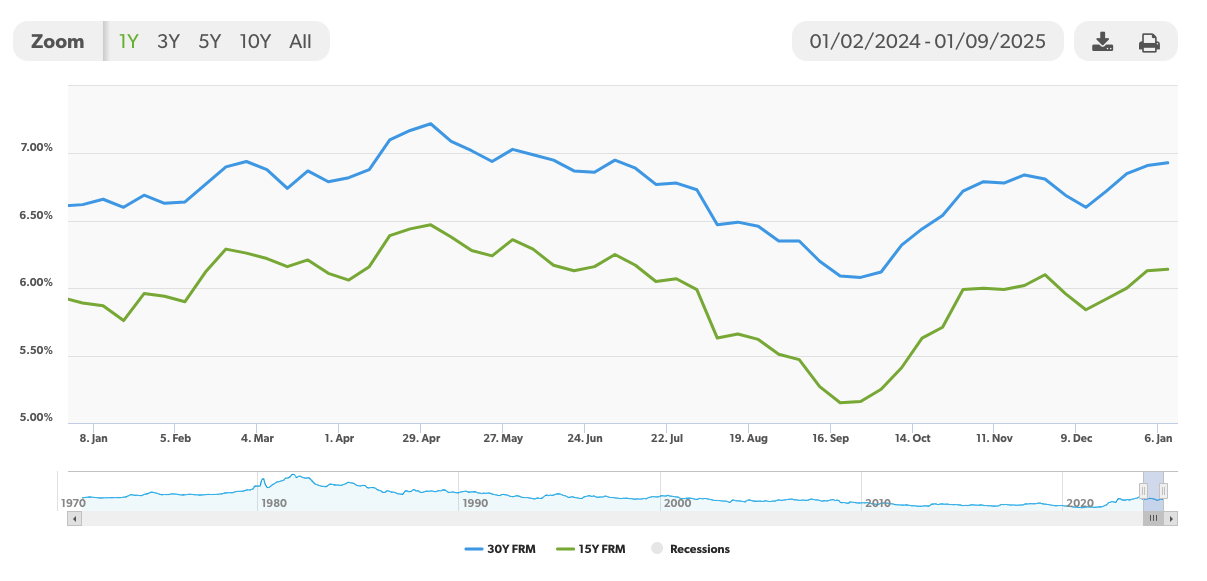
[Source: Freddie Mac]
Note that the high rates in April did not stop the price from rising, and the dip in September/October helped a price rebound that bucked the seasonal trend.
Looking Forward to 2025 and Beyond
Since the housing market is sensitive to interest rates, especially for our segment, I want to discuss my expectations for the mortgage interest rate first.
My 2025 Interest Rate ForecastThe Fed has started rate cuts in September 2024 but remains paused for now. This makes sense—with the economy performing well, there's no need to stimulate it through rate cuts that might reignite inflation. As a result, there are currently no clear drivers pushing interest rates lower.
Can the mortgage rates go further up?
The 30-year and 10-year Treasury yields rose around 18% in 2024. With the federal government running large budget deficits and its debt approaching dangerous levels, bond buyers demand higher interest rates to offset increased risks. Since mortgage rates are tied to long-term bond rates, any continued climb in bond rates will likely push mortgage rates higher as well. Given these factors, rates are more likely to rise than fall.
Of course, the Fed could stimulate the housing market by increasing its mortgage-backed securities (MBS) purchases, which would push mortgage rates down. However, there has been no indication that the Fed is considering this option. They are still winding down their tightening cycle, and as the saying goes—if it isn't broken, there's no need to fix it.
Overall, my forecast for mortgage rates in 2025 mirrors my 2024 predictions. Rates will likely remain in their current range between the low 6% and low 7%, though they could potentially climb into the mid-7% range.
Assuming that mortgage rates will remain mostly stable in 2025, let’s examine the Las Vegas real estate growth prospect.
Las Vegas Investment Real Estate 2025 OutlookUnlike complex financial markets, the housing market is relatively simple to analyze. Real estate prices and rents depend on just two key factors: supply and demand.
Supply
Supply for our segment (i.e., investment-grade Las Vegas real estate) has been in the 1-2 months range for 2024. This indicates more buyers than sellers, which is expected to increase prices.
The overall housing supply in Las Vegas has also been falling. The chart below shows the historical monthly inventory of single-family homes from 2014 to the present. The downward trend for the last ten years is apparent.
![[Source: Las Vegas Realtor Assocation MLS]](https://www.lasvegasrealestateinvestmentgroup.com/nwassets/images/MonthsOfSupplyByMonth20250116.png)
[Source: Las Vegas Realtor Association MLS]
Will/can the supply increase?
Not likely.
Given that mortgage rates are likely to stay at the current level (if not higher), existing homeowners have little motivation to move. Who would give up a sub-4% mortgage for a 7% mortgage unless you have to?
Can new homes come to the rescue?
Not in Las Vegas.
Las Vegas is a small island of private land surrounded by federal land. With minimal undeveloped private land left in the Las Vegas Valley and desirable areas costing over $1 million per acre, new homes in these locations start at $550,000. Since our target tenant segment seeks homes between $350,000 and $475,000, the supply of housing we target remains virtually unchanged regardless of new construction.
Demand
Can and will the demand for our target segment increase?
Likely.
The demand for housing is driven by population.
Las Vegas' population continues to increase at an average rate of about 2.3% per year and is projected to continue growing for the foreseeable future.
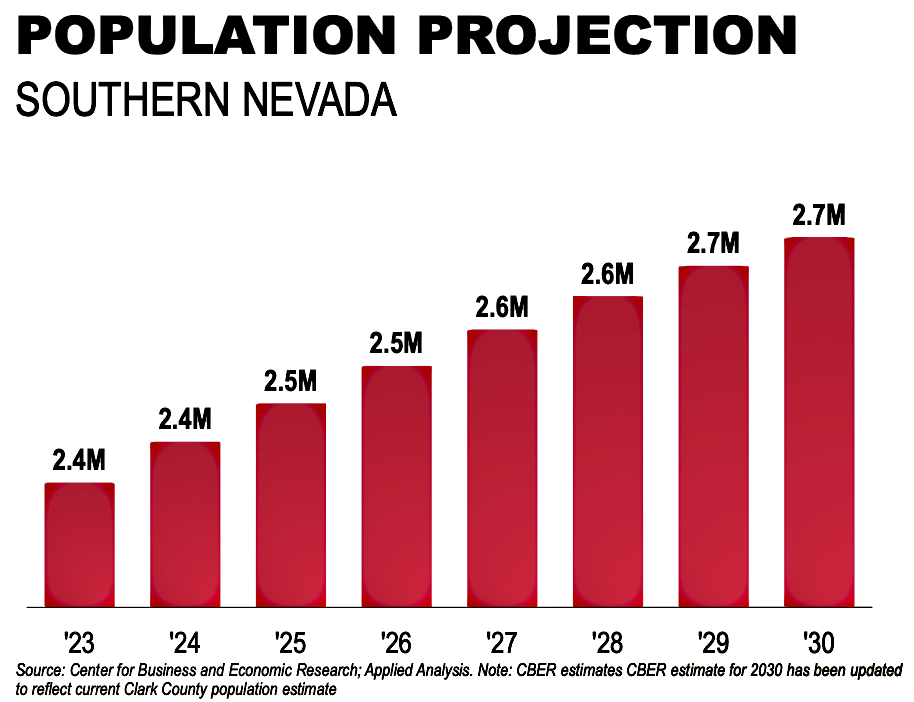
The factors that are attracting people to Las Vegas have not changed.
- Job growth - Businesses, large and small, continuously set up operations in Las Vegas. There are currently 28.3B worth of projects underway or planned. There will be worker shortages when you have this much investment going into a metro area of about 2.4M population. Jobs attract people.
- Lower cost - Lower cost of living, lower taxes, and lower cost of doing business continue to attract people and businesses from high-cost states such as California.
- Low crime: Las Vegas is Becoming the SAFEST City in America. This is part of why businesses and people are attracted to Las Vegas.
Another potential demand boost is the impact of Southern California fires. With over 10,000 homes destroyed plus an already existing housing shortage, the LA housing situation will become more undesirable. The destruction of business facilities also led to significant job losses, with many employers facing years of recovery—if they recover at all. We may see higher than usual relocation from LA to Las Vegas. Such migration would further increase demand pressure on our already limited housing supply.
When there is increasing demand and a stagnant (if not shrinking) supply, home prices and rents are bound to increase.
How fast will they increase is a much trickier question.
Although past performance doesn't guarantee future results, it remains our most reliable indicator. The following charts show the median price and rent per square foot for properties matching our target segment over the last 10 years, based on our analysis of MLS sales and rental data.
Appreciation:
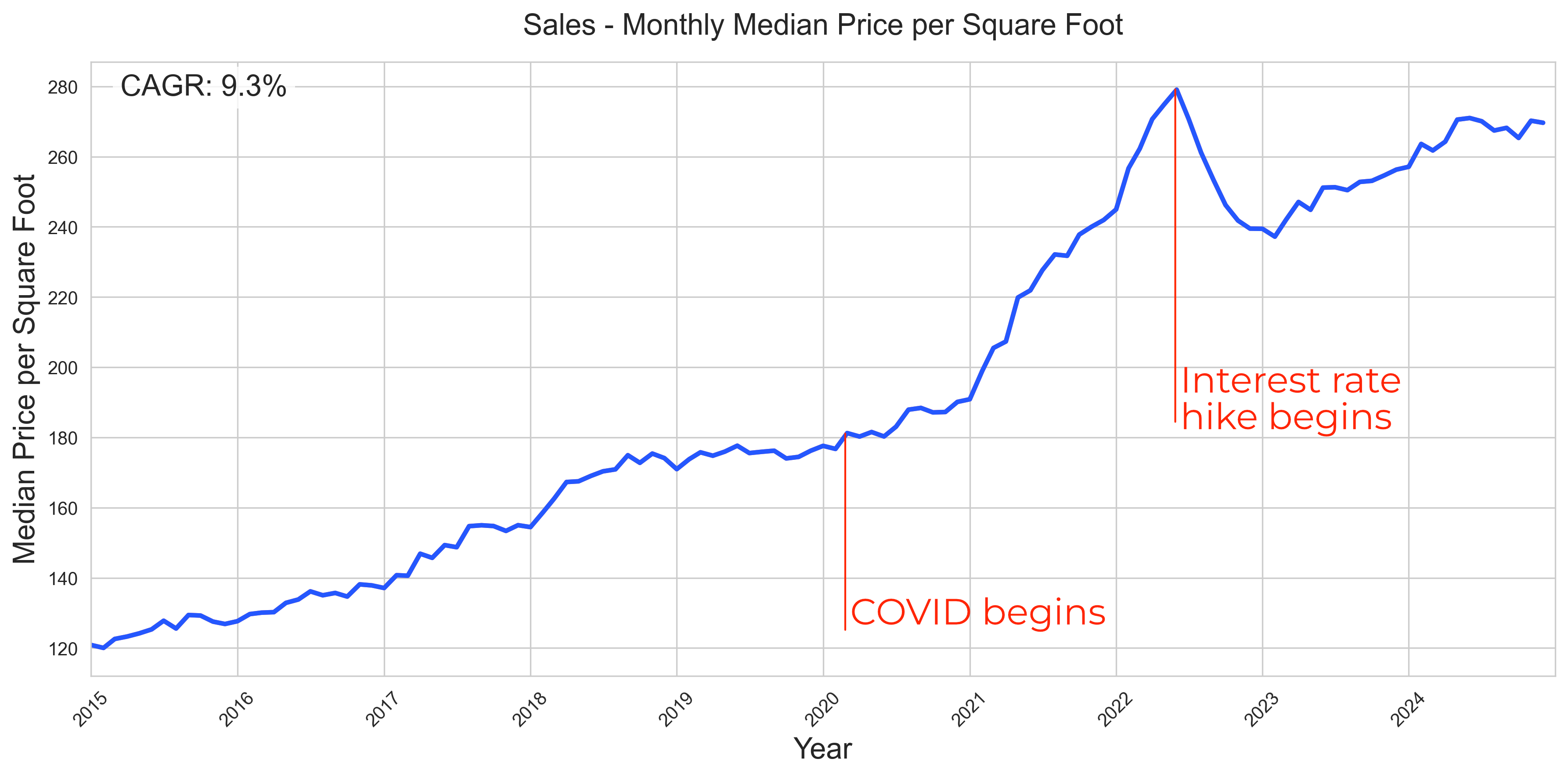
[Source: Fernwood Real Estate Investment Group]
Rent growth:
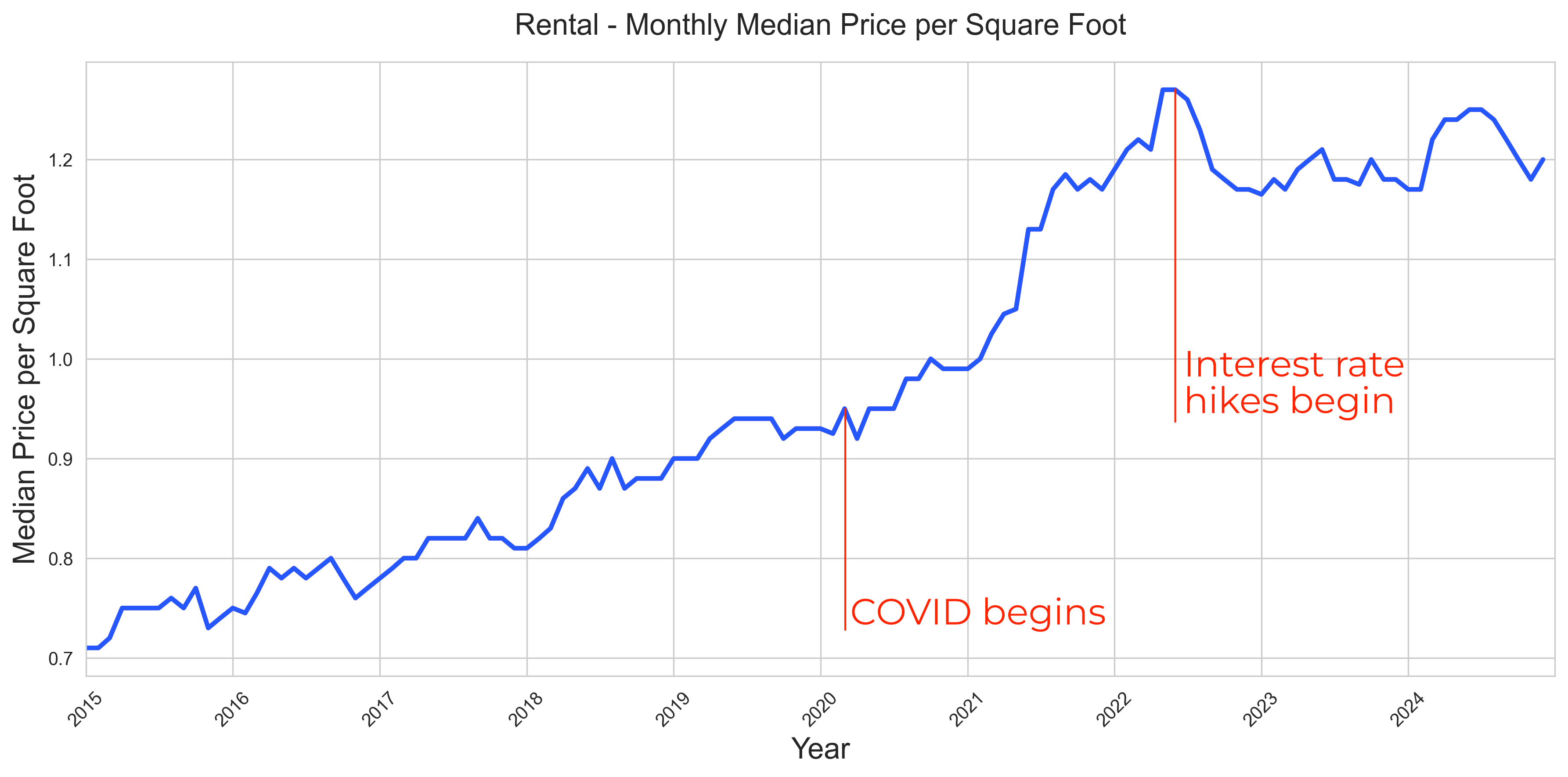
[Source: Fernwood Real Estate Investment Group]
As mentioned in my 2024 Outlook, the COVID market frenzy and the subsequent dramatic rate hikes significantly distorted price and rent trends. To better project growth rates for the next 5 years, we should examine the pre-COVID period from 2015-01-01 to 2020-03-01. The charts below show the median price and rent per square foot during this more stable period.
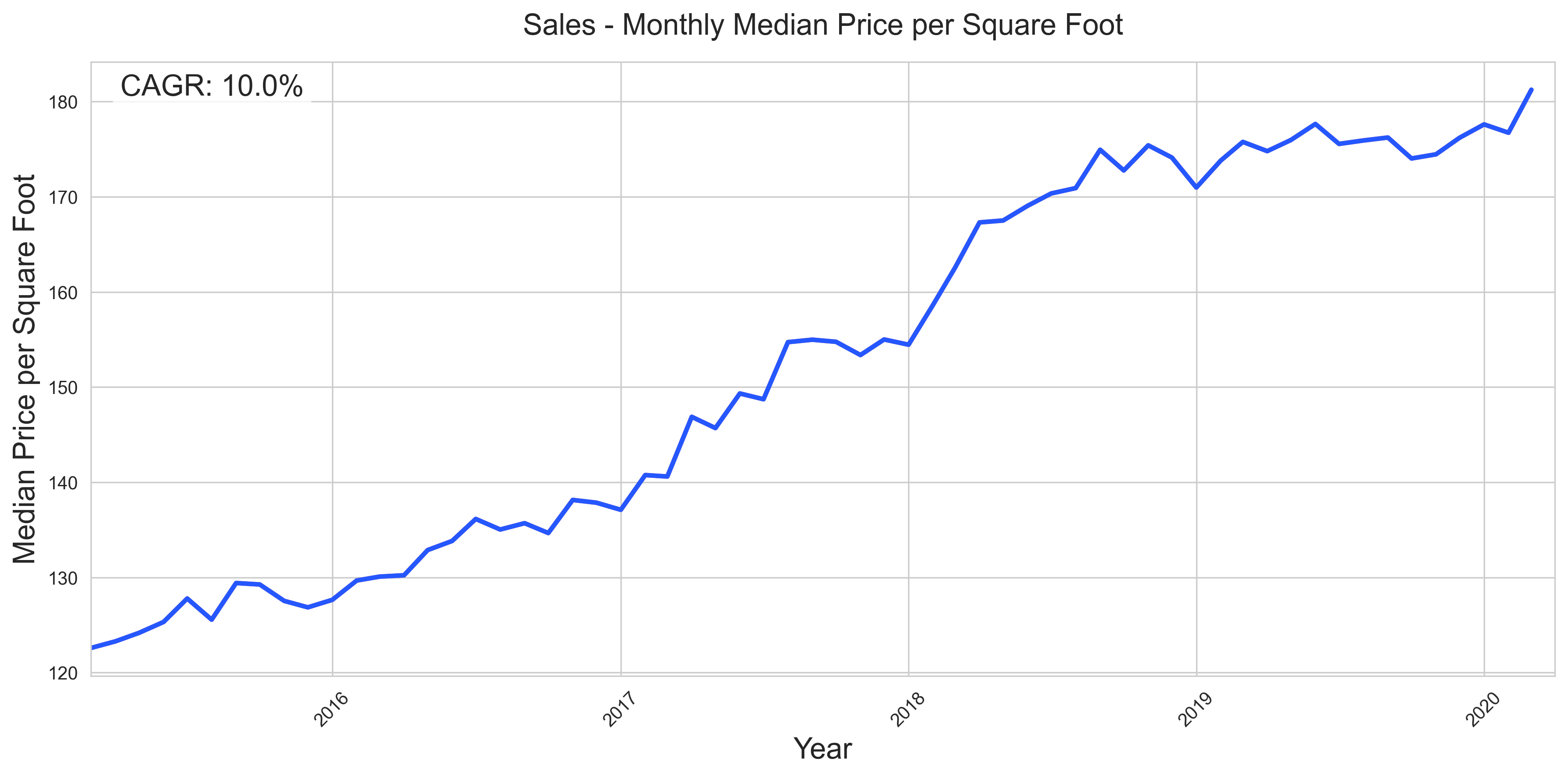
[Source: Fernwood Real Estate Investment Group]
Rent:
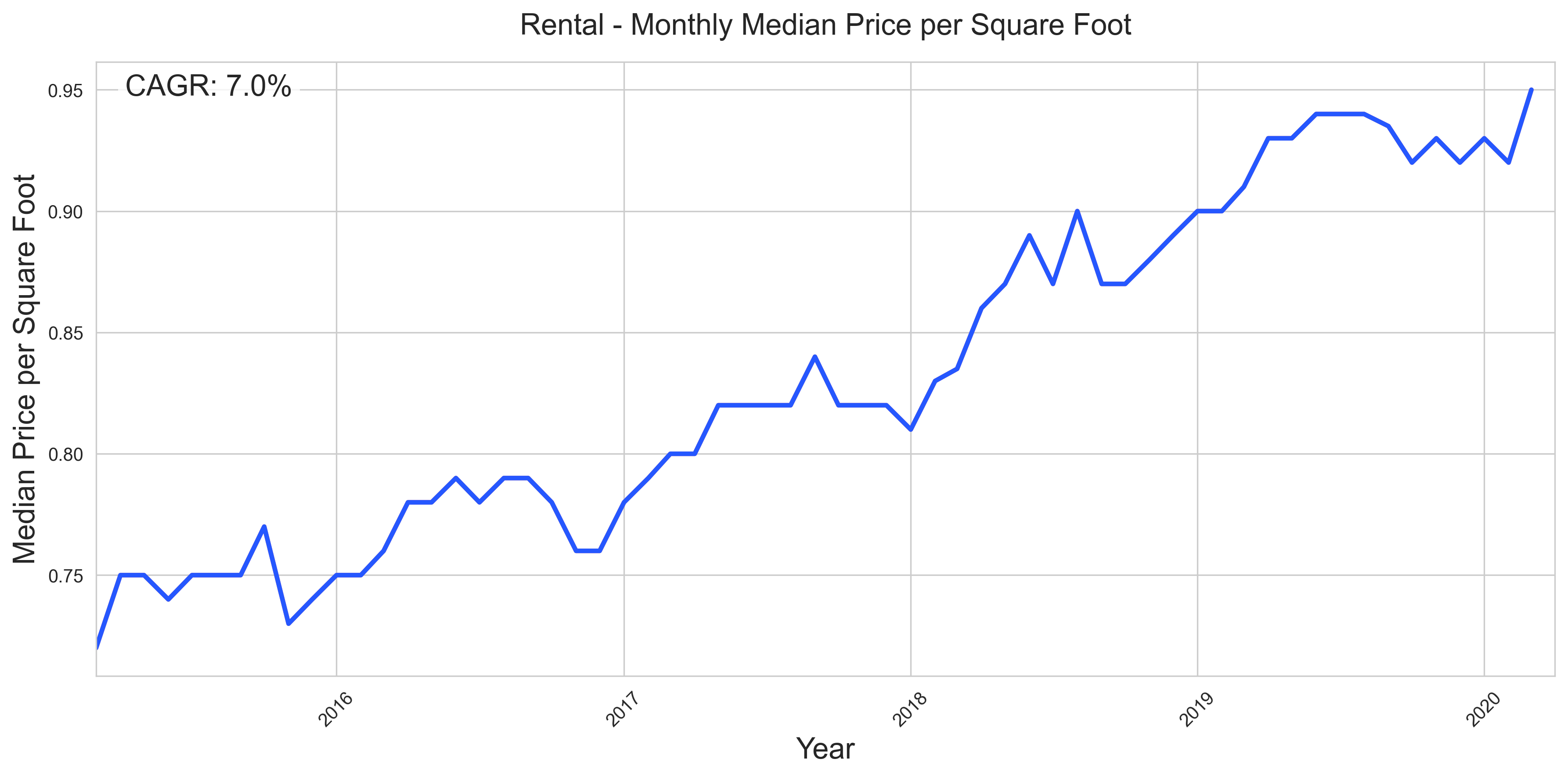
[Source: Fernwood Real Estate Investment Group]
Since the economic conditions today are similar (if not superior) to those in 2015, my expectations of the price and rent growth for the next 5 years align with the growth from 2015 to 2020. In other words, I expect the CAGR (Compounded Annual Growth Rate) for the prices for the next 5 years to be around 9-10% and the CAGR for the rents for the next 5 years around 7-8%
Of course, markets NEVER move linearly. Some years will see above-average growth, and others will see below-average growth.
Concluding Thoughts
A personal note:
Our goal is to provide you with the best information we can and be level-headed in our investor outlooks. Please let us know if you have corrections or recommendations.
Due to the continuing demand and chronically low supply (likely to get worse), we anticipate that prices and rent will continue to increase, even if interest rates do not fall. Further, we do not expect the interest rates to fall in 2025. So, if you have been considering investing in Las Vegas, waiting will not give you a “better” market condition (i.e., lower prices or lower interest rates) to enter. Rather, waiting will result in higher prices and loss of appreciation that could have been captured by acting now.
If interest rates do fall meaningfully in 2025—though this scenario is less likely—prices in our segment will increase rapidly as more buyers enter the market and compete for limited inventory. In this scenario, investors who act early rather than late will avoid missing out on this appreciation.
If you're interested in exploring how the current Las Vegas market conditions could align with your goals, please use the link below to schedule a time that works best for you.
 Post: Las Vegas Appreciation and Rent Growth Rate by Zip Codes
Post: Las Vegas Appreciation and Rent Growth Rate by Zip Codes
- Realtor
- Las Vegas, NV
- Posts 824
- Votes 1,574
Warning: This post contains many charts, and I did not see a way to simplify the presentation.
The zip codes in this study include: 89002, 89011, 89014, 89015, 89031, 89032, 89044, 89052, 89074, 89084, 89117, 89123, 89128, 89129, 89131, 89134, 89135, 89138, 89139, 89141, 89143, 89145, 89147, 89148, 89149, 89178, and 89183. See the map below for where these zip codes are located.
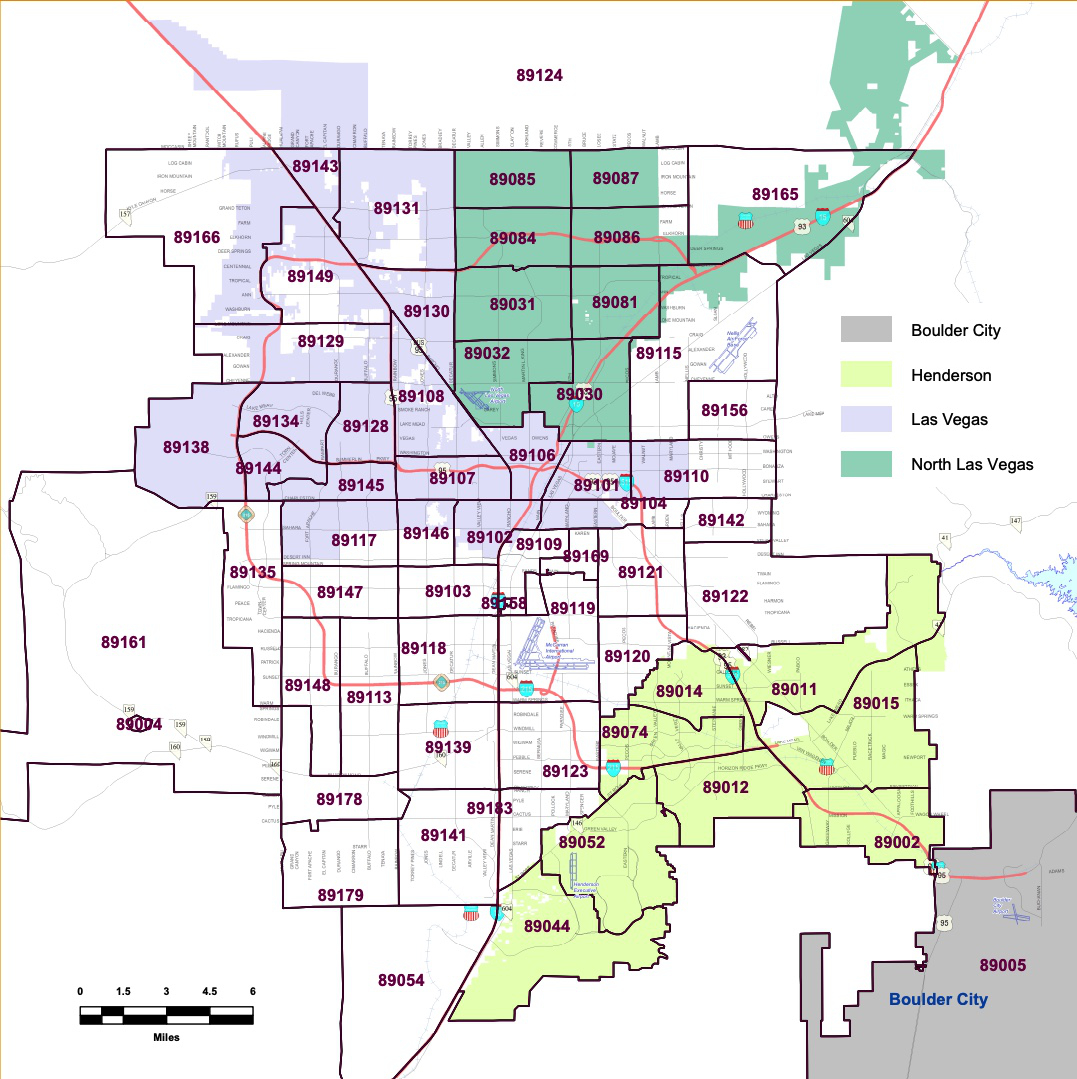
Note: The following charts only include properties in the above zip codes that generally match our property profile: single-family homes featuring 3-4 bedrooms, 2-3 bathrooms, 2-3 car garages, 1,100 to 2,400 square feet of living space, 1 or 2 stories, and lot sizes ranging from 3,000 to 6,000 square feet, built on or after 1985.
Appreciation
10-Year $/SF by Zip Code 2015-01-01 to 2024-12-31
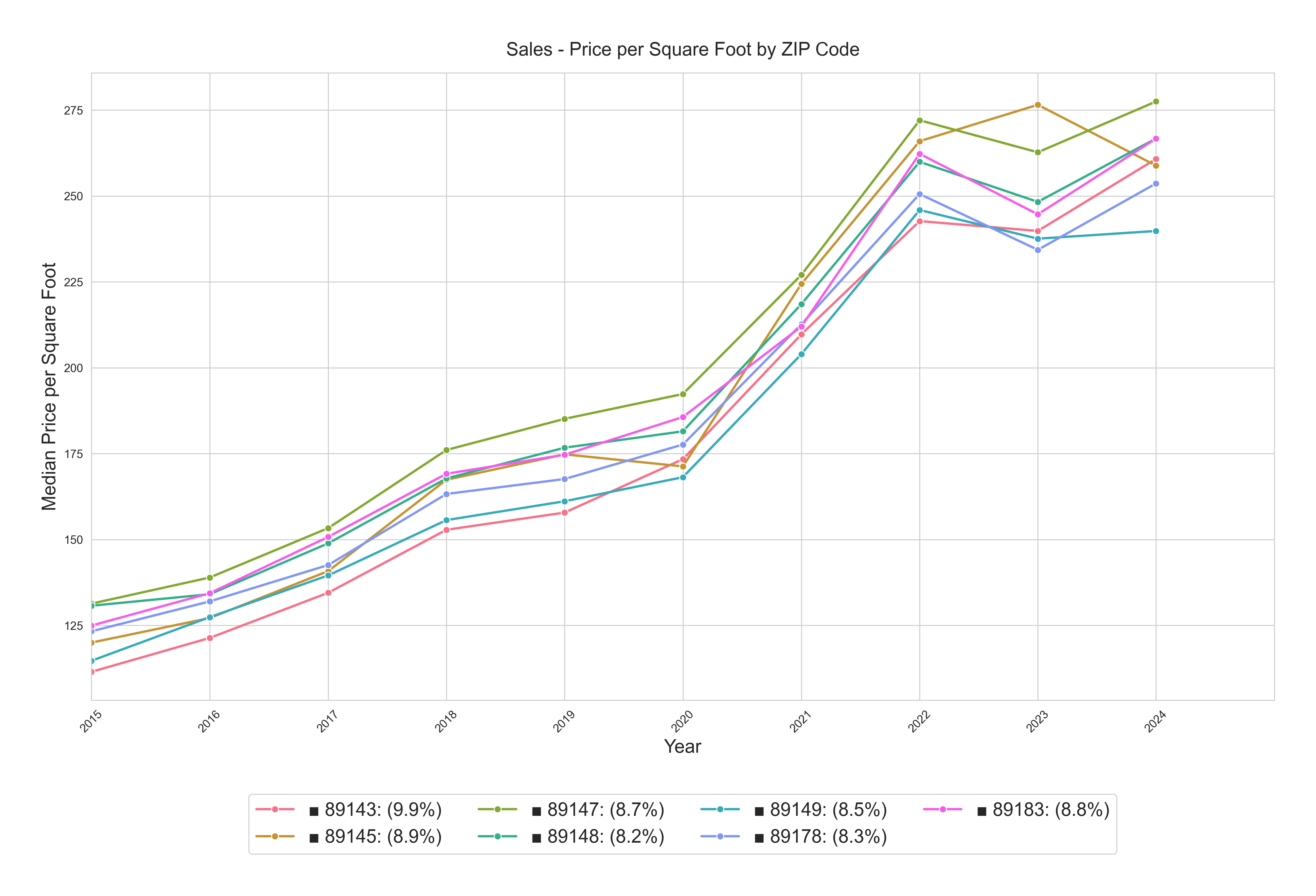
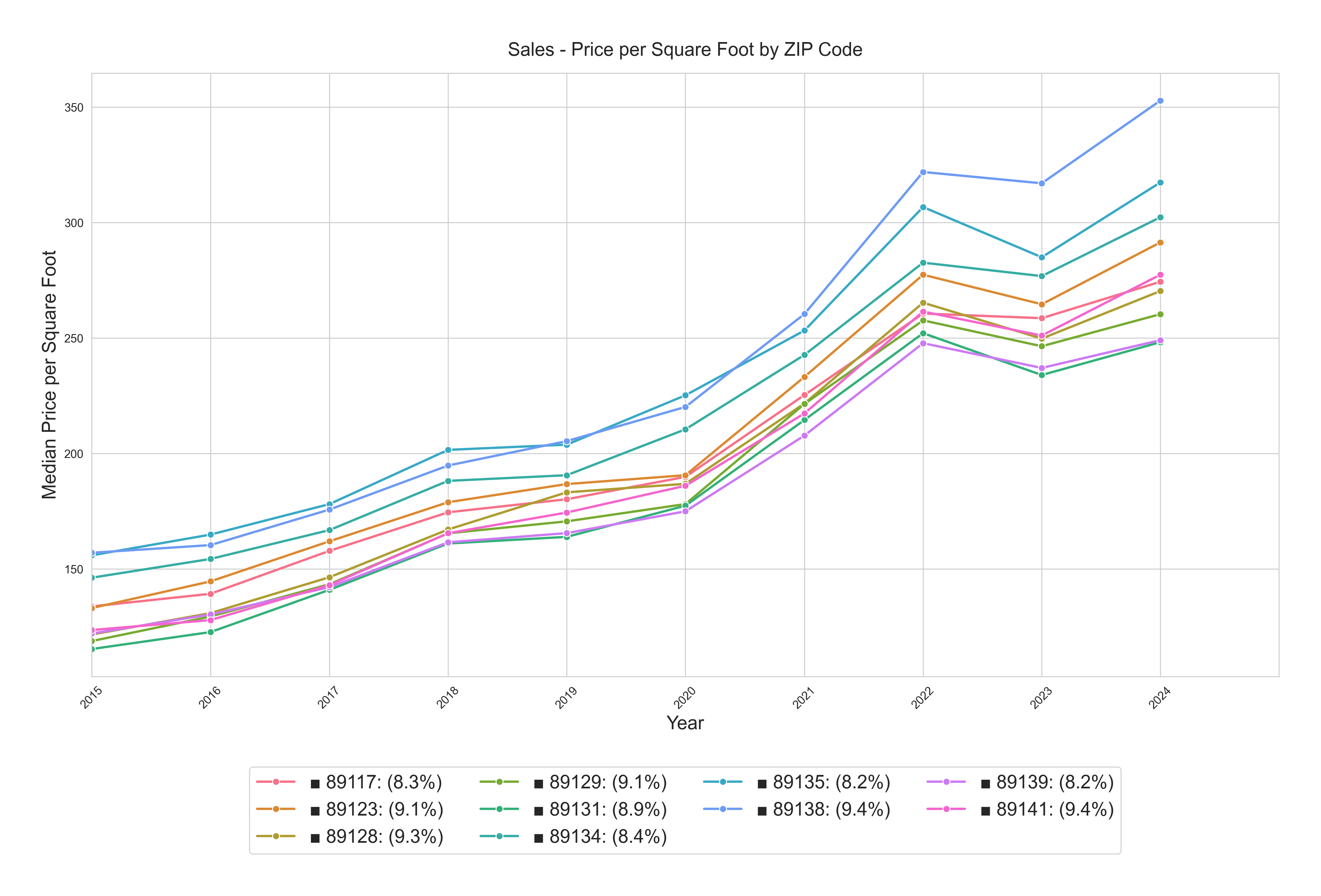
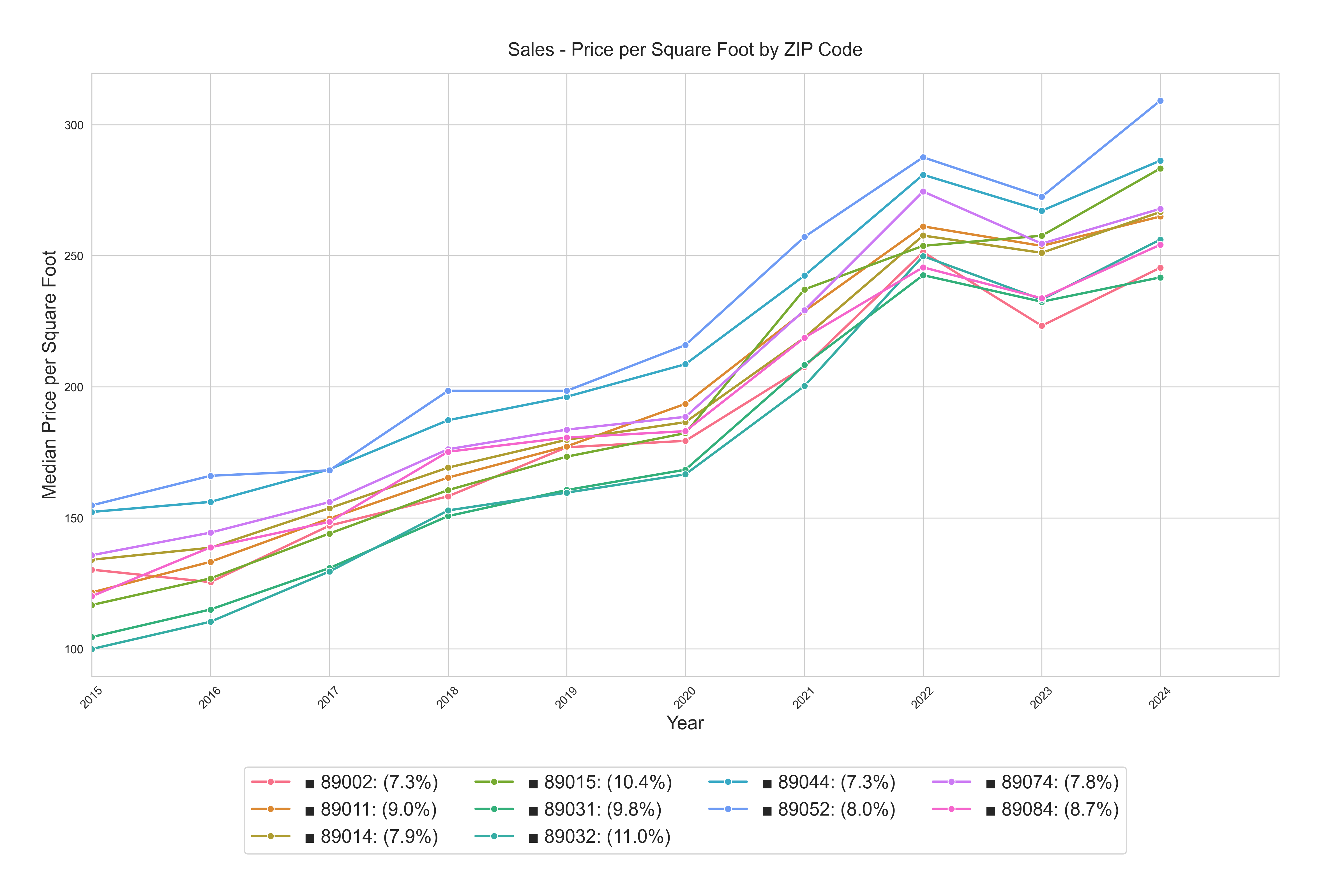
From the above charts, these zip codes appear to appreciate the fastest among our target areas (based on annualized growth rate)
- 89032 (North Las Vegas), 11.0%
- 89015 (Henderson), 10.4%
- 89143 (Centennial Hills), 9.9%
- 89031 (North Las Vegas), 9.8%
- 89138 (Summerlin), 9.4%
- 89141 (Blue Diamond, Southern Highlands), 9.4%
- 89128 (Summerlin), 9.3%
- 89123 (Silverado Ranch), 9.1%
- 89129 (Northwest), 9.1%
5-Year Pre-COVID $/SF by Zip Code 2015-01-01 to 2020-03-01
The COVID market frenzy and the subsequent dramatic rate hikes significantly distorted price and rent trends. To better project growth rates for the next five years, we should examine the pre-COVID period from 2015-01-01 to 2020-03-01. The charts below show the median price trend during this more stable period.
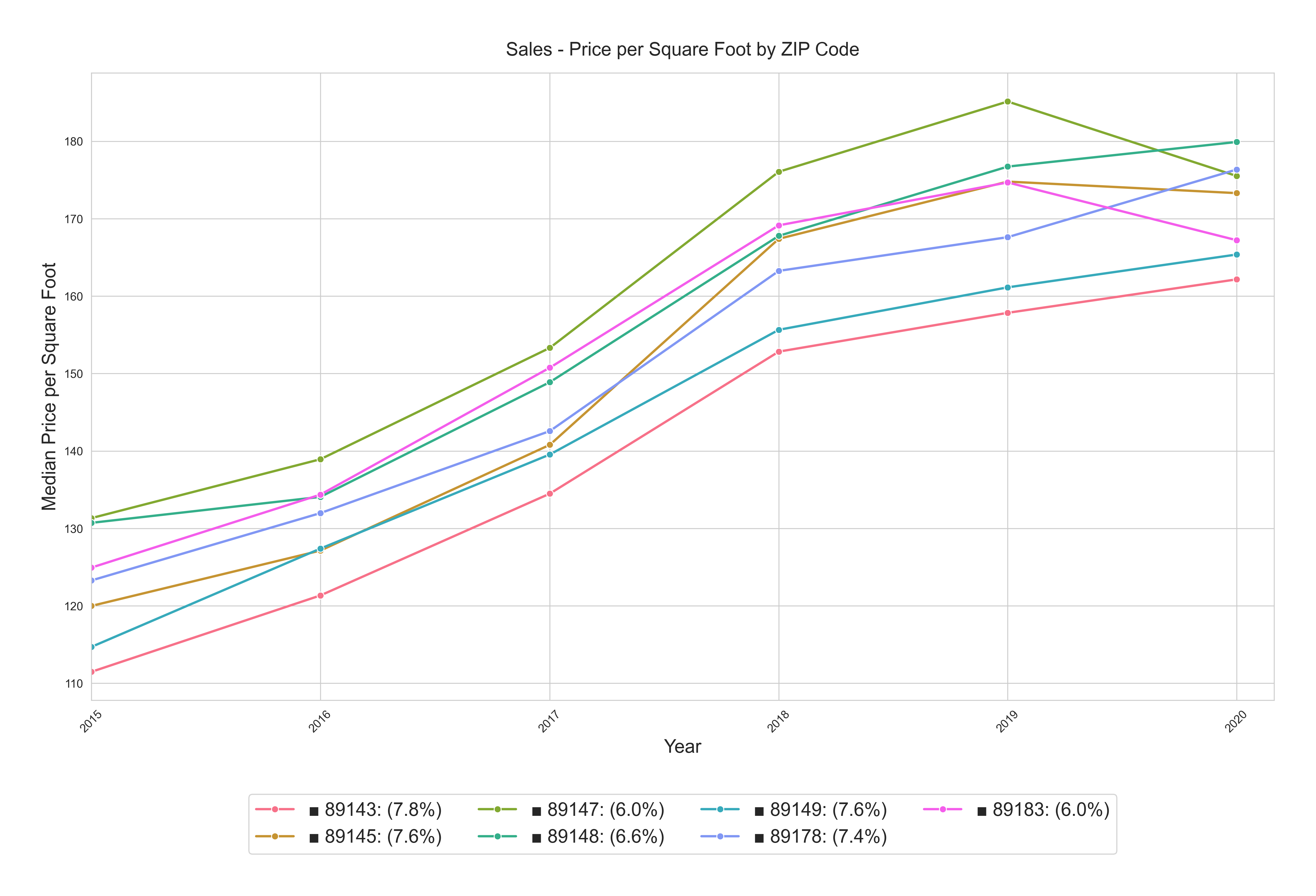
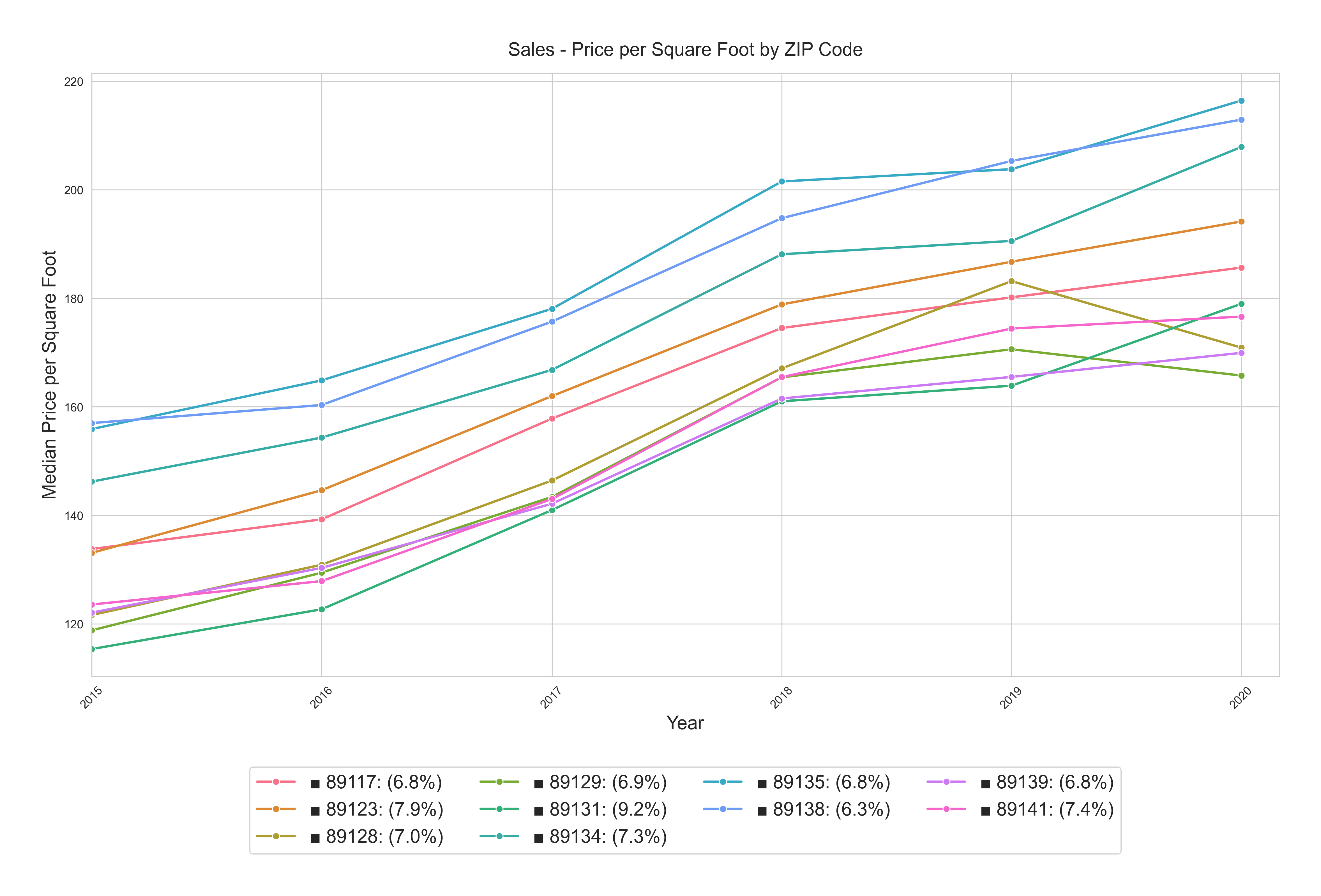

The higher appreciating zip codes during the 5-year pre-Covid period appear to be:
- 89032 (North Las Vegas), 10.2%
- 89015 (Henderson), 9.7%
- 89131 (Centennial Hills), 9.2%
- 89031 (North Las Vegas), 9.2%
- 89084 (Aliante), 8.5%
- 89011 (Henderson), 8.1%
- 89123 (Silverado Ranch), 7.9%
- 89141 (Blue Diamond, Southern Highlands), 7.4%
- 89134 (Summerlin), 7.3%
Rent Growth
10-Year Rents $/SF by Zip Code 2015-01-01 to 2024-12-31
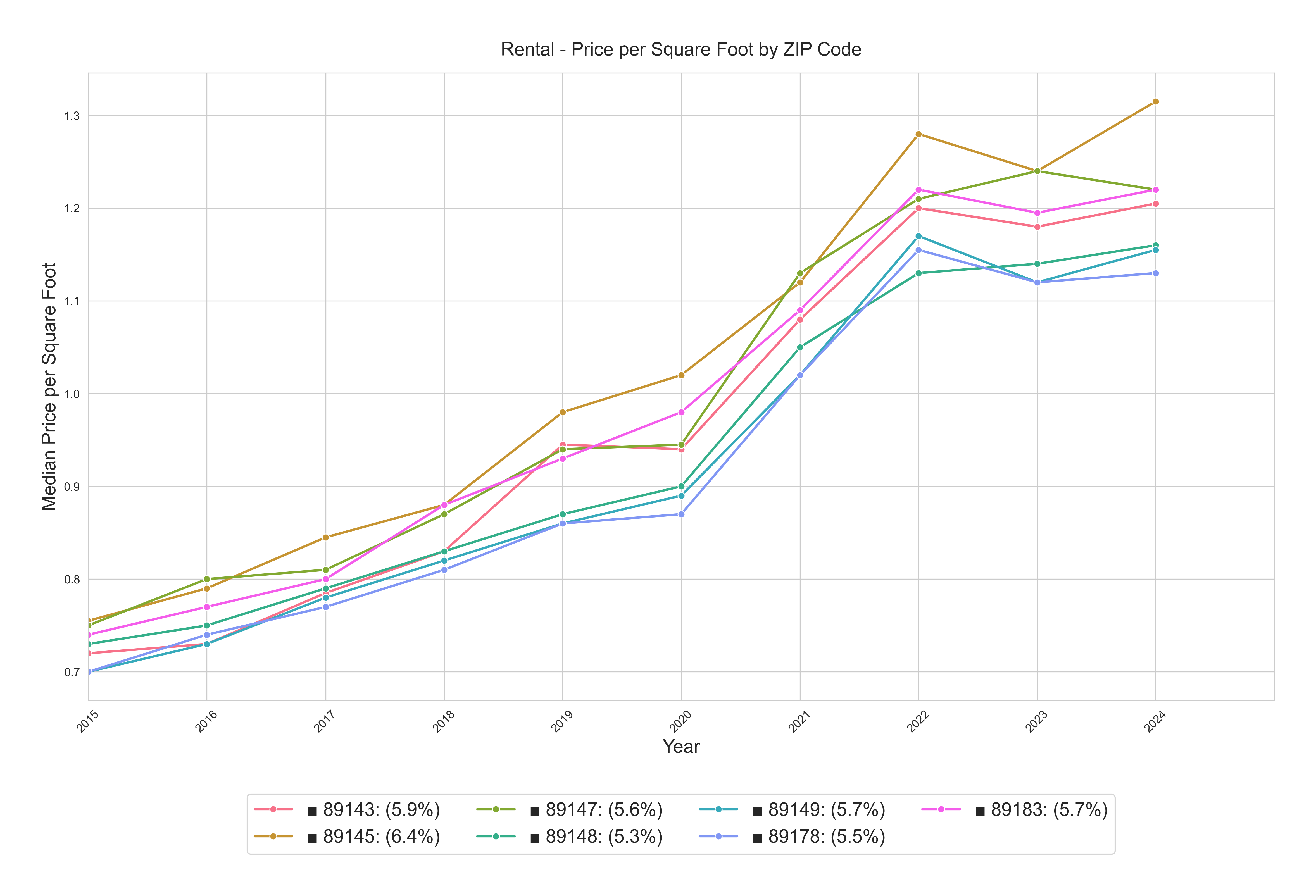
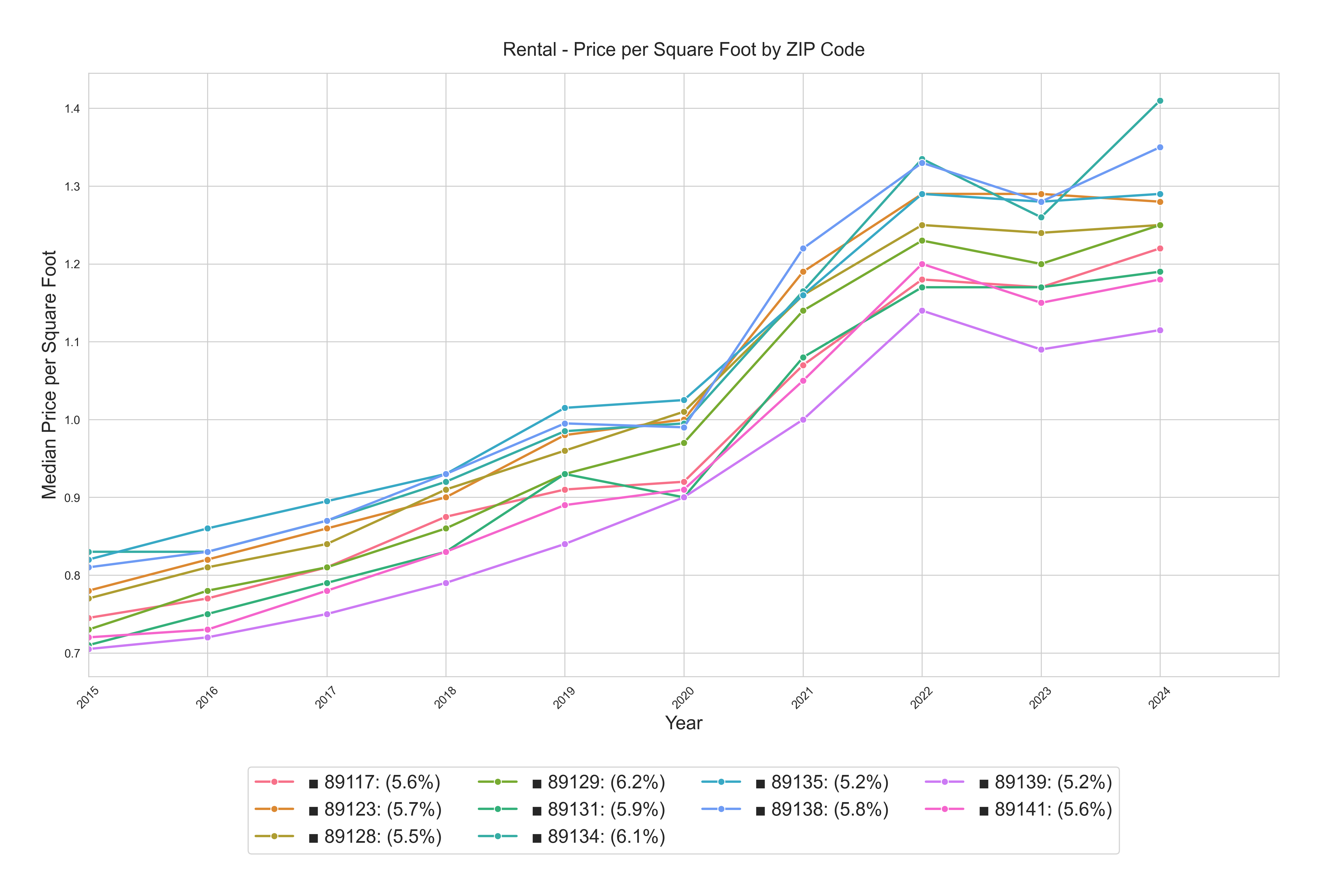
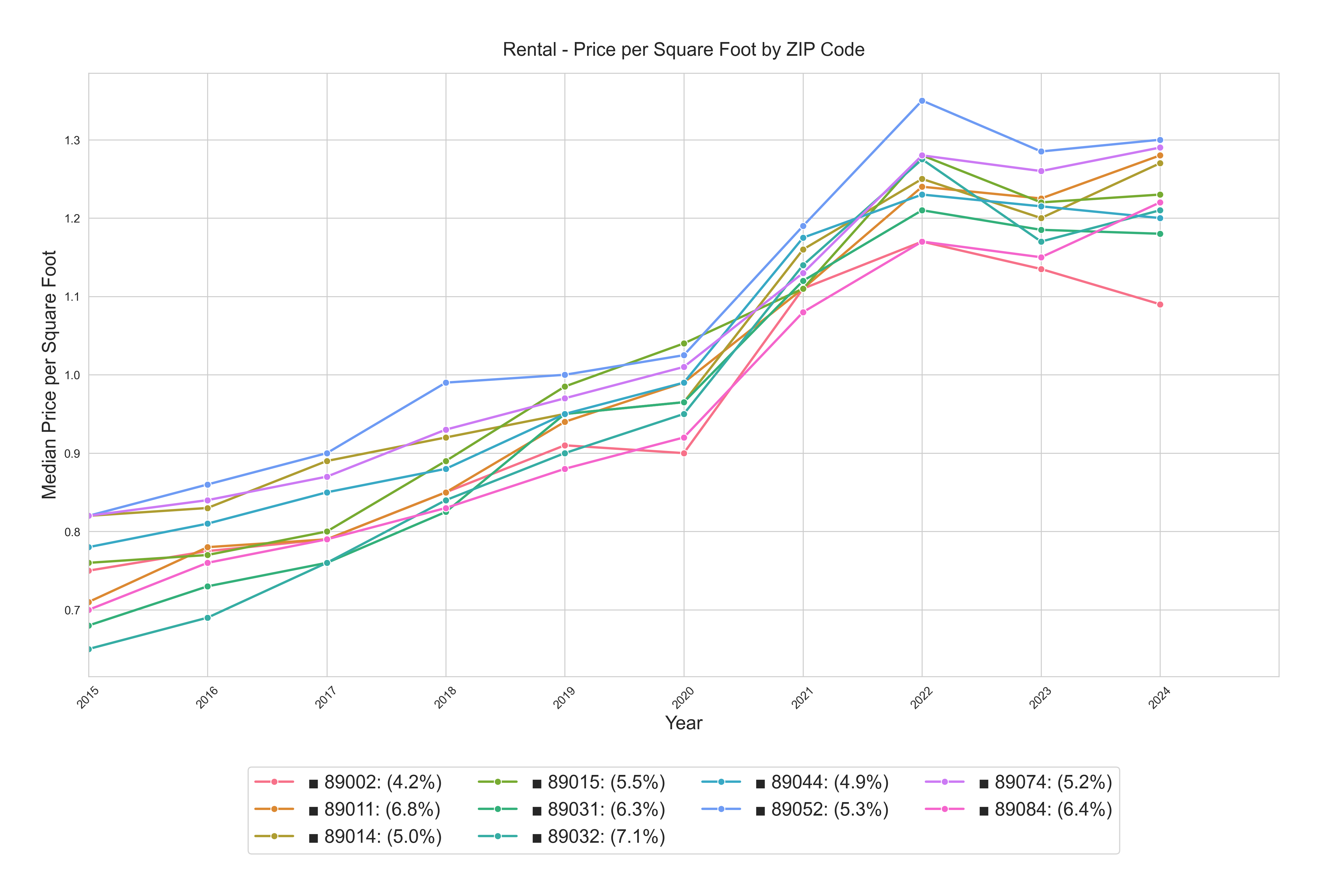
The higher rent growth zip codes for the last 10 years appear to be:
- 89032 (North Las Vegas), 7.1%
- 89011 (Henderson), 6.8%
- 89084 (Aliante), 6.4%
- 89145 (Summerlin adjacent), 6.4%
- 89031 (North Las Vegas), 6.3%
- 89134 (Summerlin), 6.1%
5-Year Pre-Covid Rents Trend $/SF by Zip Code 2015-01-01 to 2020-03-01
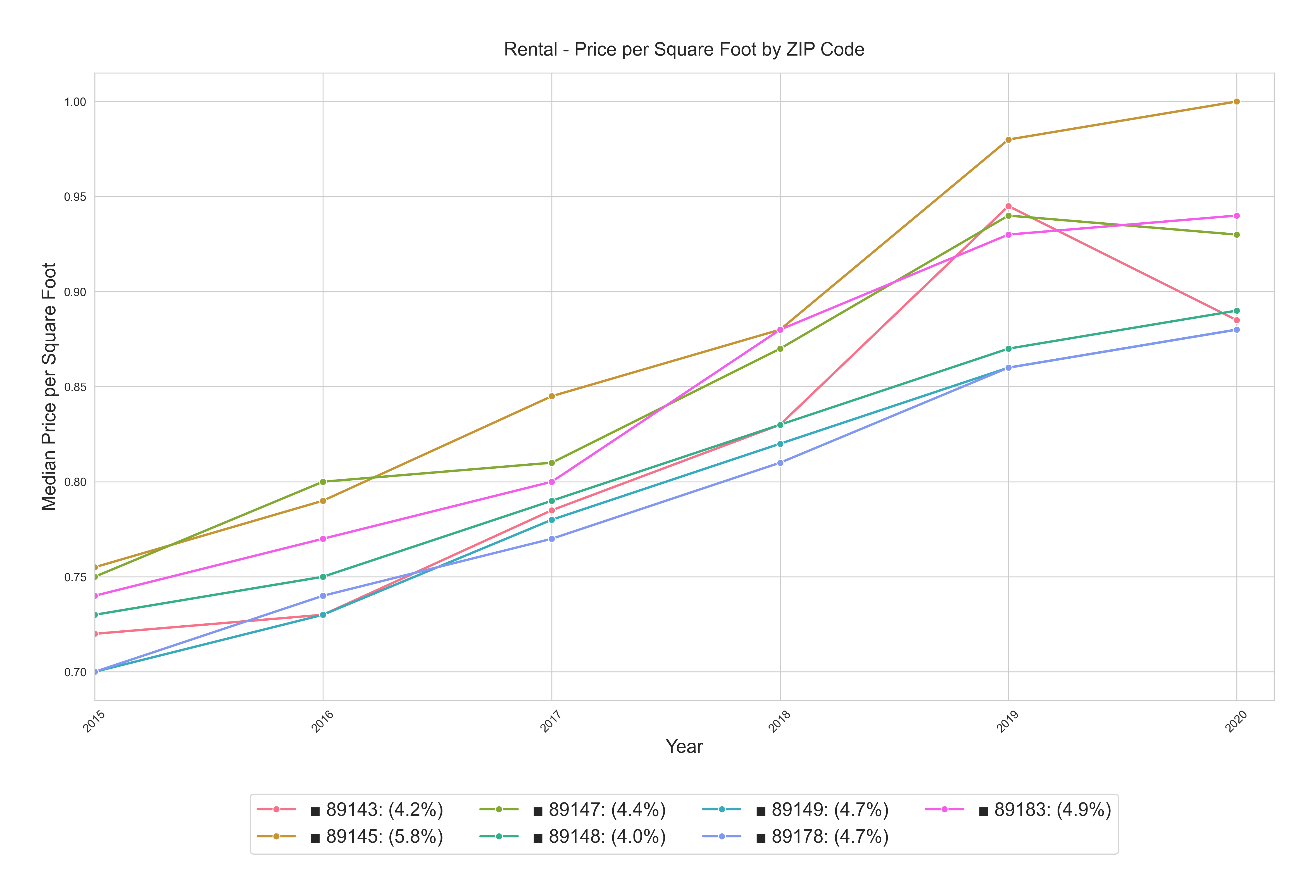
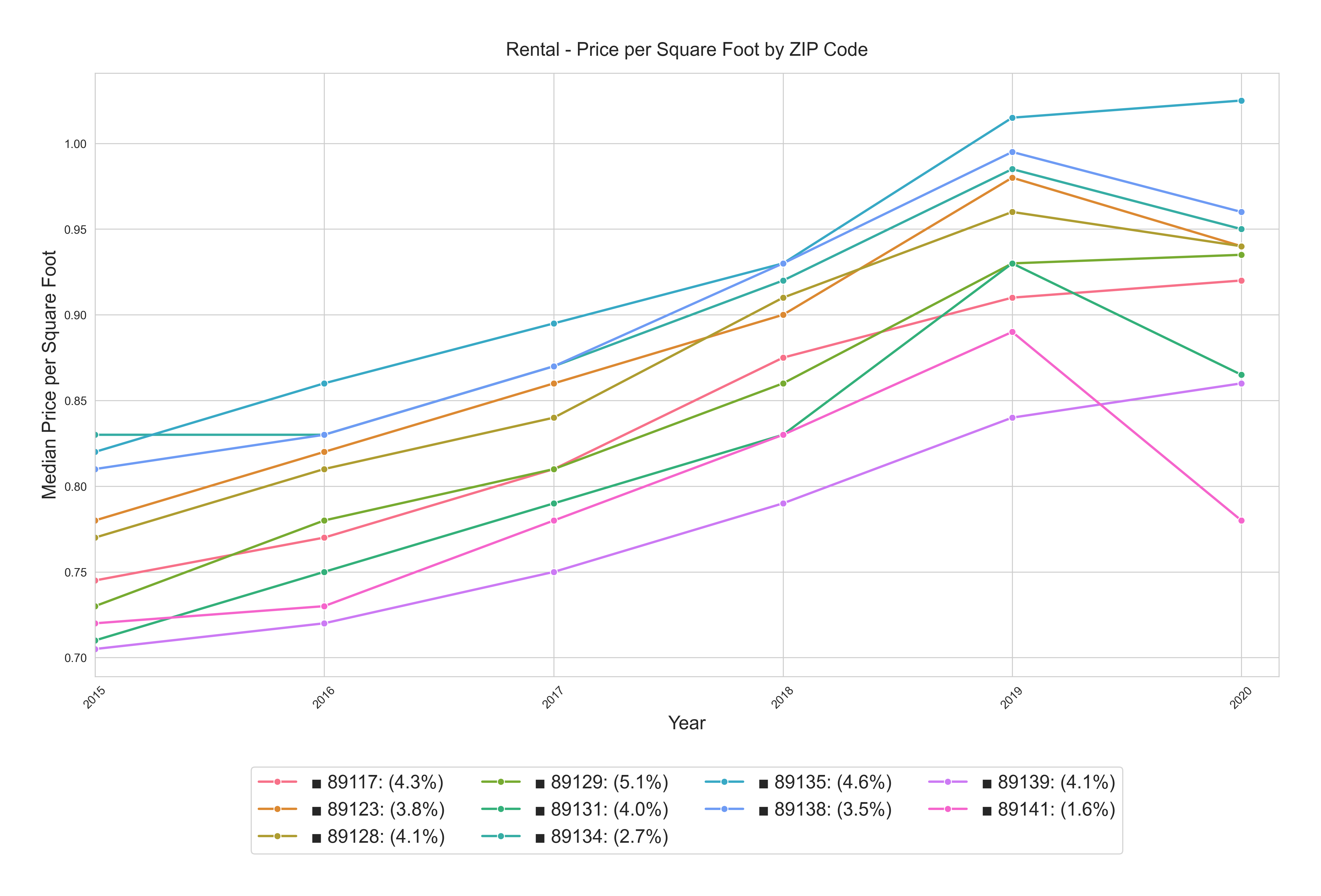
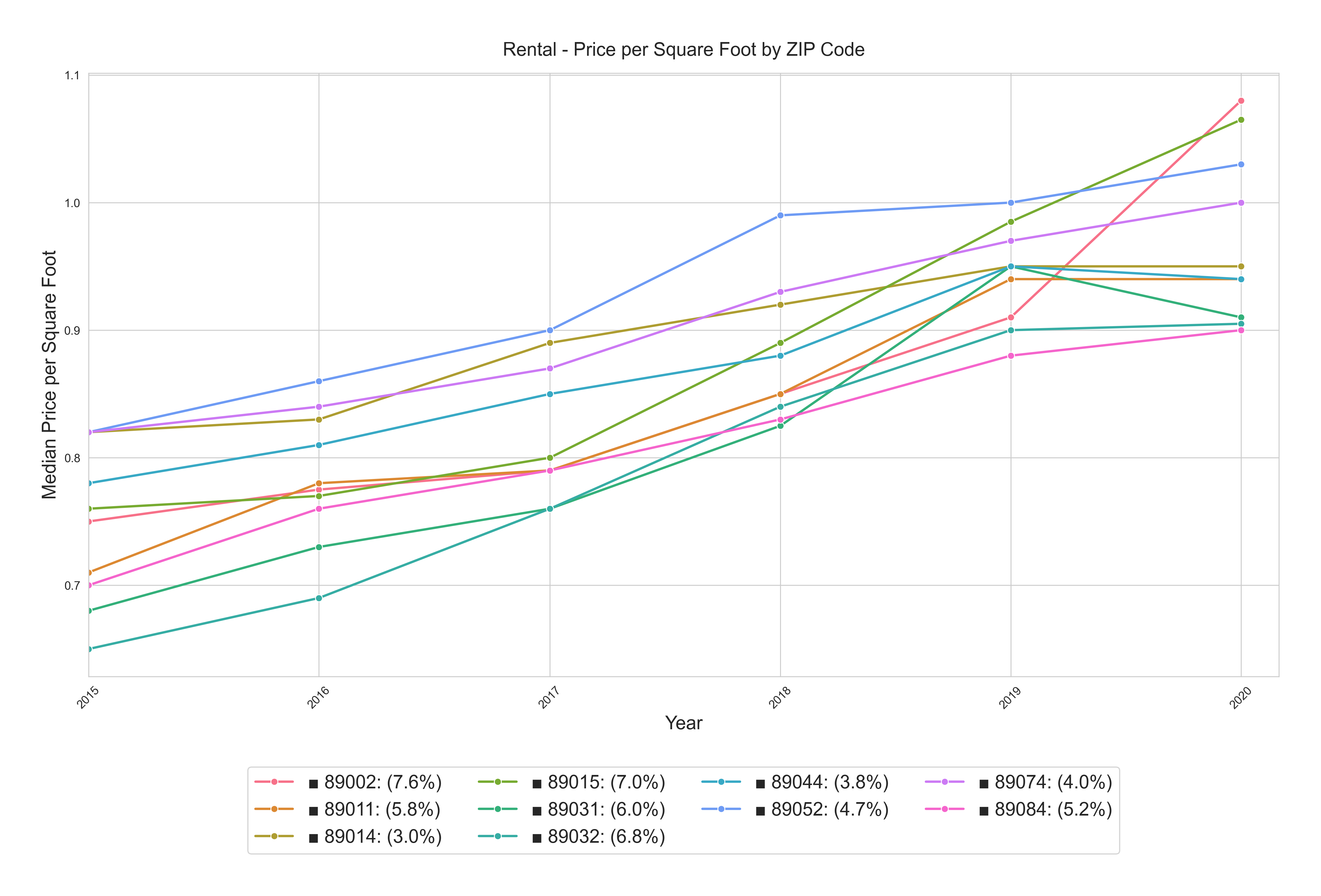
The faster rent growth zip codes during the 5-year pre-Covid period appear to be:
- 89002 (Henderson), 7.6%
- 89015 (Henderson), 7.0%
- 89032 (North Las Vegas), 6.8%
- 89031 (North Las Vegas), 6.0%
- 89011 (Henderson), 5.8%
- 89145 (Summerlin adjacent), 5.8%
Concluding Thoughts
If past performance is any indication of future performance, the data shows that properties in certain parts of North Las Vegas, Henderson, Centennial Hills, Silverado Ranch, and certain Summerlin areas may appreciate faster than the other areas of our target area. Properties in Henderson, certain parts of North Las Vegas, and adjacent to Summerlin may provide faster rent growth.
However, we recommend not using this data for your property search criteria. A zip code average of an area does not represent an individual property’s characteristics. Each property should be evaluated based on its characteristics and overall quality as an investment.
 Post: From a finance perspective, how does investing in a high rate environment work?
Post: From a finance perspective, how does investing in a high rate environment work?
- Realtor
- Las Vegas, NV
- Posts 824
- Votes 1,574
Hello @Alex Silang,
It depends on your goal. If your goal is day-one cash flow, the current high interest rates will make it very difficult. If your goal is financial freedom, which is a long-term goal, not so much.
Financial freedom is a long-term proposition, not a one-time event. Financial freedom isn't simply about replacing your current income, because inflation continuously drives up prices, making a fixed income insufficient to maintain your standard of living. You need an income that meets three requirements:
- Rents increase faster than inflation to offset constantly rising prices.
- It must be reliable; it continues even during economic downturns.
- It must last throughout your lifetime.
These are all long-term requirements, so the current interest rates are not the major issue. Interest rates will eventually come down. When they do, you can refinance to a lower rate.
Dealing with current high interest rates (about 7% on 01/27/2025) you have the following choices:
- A larger down payment
- Accept a negative cash flow
- Buy down the interest rate
Combine and balance all three to get an acceptable cash flow today. However, what is far more important for financial freedom is the location/city where you invest.
The city where you invest is far more important than the current interest rate. The city determines whether your investment can meet the three requirements mentioned above. What happens if you invest in a city where rents don't keep up with inflation?
For instance, let's say you purchase property in a city where rents rise by 2% per year, while inflation is at 5% per year. Your starting rent is $2,000 per month, and your expenses remain steady at $1,700 per month. What would your inflation-adjusted monthly income be in 5, 10, and 15 years?
- Year 0: ($2,000 - $1,700) x (1 + 2%)^0 / (1 + 5%)^0 ≈ $300 in today’s buying power.
- Year 5: ($2,000 - $1,700) x (1 + 2%)^5 / (1 + 5%)^5 ≈ $260 in today’s buying power.
- Year 10: ($2,000 - $1,700) x (1 + 2%)^10 / (1 + 5%)^10 ≈ $225 in today’s buying power.
- Year 15: ($2,000 - $1,700) x (1 + 2%)^15 / (1 + 5%)^15 ≈ $194 in today’s buying power.
So, if you purchase property in a city where rent increases at a slower pace than inflation, the amount of goods and services you can buy will decrease over time due to inflation.
Here is what I recommend:
- Purchase in a city that possesses the following characteristics.
- Significant and sustained population growth.
- Rapid and sustained appreciation
- Balance negative cash flow, interest rate buydown, and increased down payment to create an acceptable cash flow situation today.
- Refinance when rates fall to increase cash flow.
 Post: How to self-manage out-of-state property
Post: How to self-manage out-of-state property
- Realtor
- Las Vegas, NV
- Posts 824
- Votes 1,574
Hello @Yooni Choi,
While managing an out-of-state rental property yourself might seem like a money-saving strategy, the reality is much more complex. Drawing from my experience delivering over 550 investment properties, I can say with certainty that self-management isn't practical for most investors. In fact, even with my extensive experience, I choose to have all my properties professionally managed.
Here's why:
Tenant Selection Is Critical
The most valuable service a property manager provides is selecting reliable tenants. The wrong tenant can lead to non-payment, evictions, and property damage. Finding someone with the expertise to screen and place tenants properly is rare. Personally, after working with numerous property managers in Las Vegas, I only trust two to handle this task for my properties.
Compliance Is Complicated
Property management involves navigating a maze of city, state, and federal regulations. Professional property managers stay updated on legal requirements through memberships in state or national organizations. Unless you're monitoring these regulations full-time, it's easy to make costly mistakes. Even a single error could cost you more than years of property management fees.
Understanding Tenant Behavior
Properties don’t pay rent—tenants do. A skilled property manager understands tenant segments and their behaviors, which helps attract reliable renters. They can also guide you in choosing properties that appeal to dependable tenant demographics.
Access to Reliable Vendors
Property managers have established networks of cost-effective contractors for renovations and repairs. Without these connections, you’re likely to spend more time and money finding reliable help.
Enforcing Lease Terms
Proactively managing tenants and enforcing lease terms reduces the risk of evictions and other issues. This requires consistent oversight and experience, which most investors simply don’t have.
The Bottom Line
If you want to lose money and risk expensive legal fees, go ahead and self-manage. Otherwise, leave it to the professionals who have the experience, systems, and resources to do it right.
 Post: Las Vegas REI Virtual Meetup - 2025 Investor Outlook
Post: Las Vegas REI Virtual Meetup - 2025 Investor Outlook
- Realtor
- Las Vegas, NV
- Posts 824
- Votes 1,574
Each January, we publish our Las Vegas investment outlook for the upcoming year. We will present our findings for 2025 during the first 20 - 30 minutes of this virtual REI Meetup, with the remainder of the time for addendee Q&As.
We look forward to seeing you there.
 Post: Why BRRRR is not an effective strategy today...
Post: Why BRRRR is not an effective strategy today...
- Realtor
- Las Vegas, NV
- Posts 824
- Votes 1,574
Hi @Alan Asriants,
I agree that the traditional BRRRR strategy is ineffective in today's market. This is primarily due to two key factors: low inventory (leading to tight margins) and high interest rates. However, real estate investing is long-term, and markets are always changing. What doesn't work today may work in the future.
Another challenge with the traditional BRRRR model is the resulting high debt load often isn't fully covered by rental income, especially in today's high-rate environment. A more viable approach could be a straight 75% cash-out refinance—but only if you’ve invested in a city with strong, sustained population growth. This growth typically drives significant appreciation, which is the key to making this strategy work.
For example:
Let’s say you purchase a property for $300,000 with 25% down in a market with an 8% annual appreciation rate. How long would it take before a 75% cash-out refinance allows you to pay off the mortgage and have enough cash for a 25% down payment on another property priced at $350,000?
- Year 1: $300,000 × (1 + 8%)¹ × 75% - $300,000 × (1 - 25%) ≈ $18,000
- Year 2: $300,000 × (1 + 8%)² × 75% - $300,000 × (1 - 25%) ≈ $37,440
- Year 3: $300,000 × (1 + 8%)³ × 75% - $300,000 × (1 - 25%) ≈ $58,435
- Year 4: $300,000 × (1 + 8%)⁴ × 75% - $300,000 × (1 - 25%) ≈ $81,110
- Year 5: $300,000 × (1 + 8%)⁵ × 75% - $300,000 × (1 - 25%) ≈ $105,599
After about four years, you’d have enough equity to cover your next property's $87,500 down payment (25% of $350,000). However, the success of this approach hinges on consistent appreciation, which depends on demand.
The Key Factors to Consider
- Price Dynamics: Prices are driven by the balance between buyers and sellers. With more sellers than buyers, prices will fall until equilibrium is reached. Conversely, if there are more buyers than sellers, prices will rise.
- Rental Demand: Rents are closely tied to prices. Fewer people can afford to buy when prices are high, increasing demand for rentals and driving up rents. When prices drop, rental demand decreases, putting downward pressure on rents.
The Takeaway
The critical factor for success with this strategy is location—specifically, investing in areas with significant and sustained population growth. This growth fuels demand, drives appreciation, and ultimately makes strategies like BRRRR or cash-out refinancing viable over the long term.
 Post: Nevada, Ohio, Michigan, Pennsylvania Out of State Investing
Post: Nevada, Ohio, Michigan, Pennsylvania Out of State Investing
- Realtor
- Las Vegas, NV
- Posts 824
- Votes 1,574
Hello @Tove Fox,
You are not investing in a state, you will invest in an individual city. I recommend selecting an investment city based on the following criteria.
Key Criteria for Choosing an Investment City
-
Rents Must Outpace Inflation
Financial freedom depends on rental income growing faster than inflation. For example, with 5% inflation, a $100 basket of goods today will cost $162 in ten years. If rents don’t keep up, your income won’t sustain rising costs.
What Drives Rent Growth?
- Supply and Demand: When buyers outnumber sellers, prices and rents rise.
- Population Growth: Cities with significant and sustained population increases are more likely to see long-term rent growth.
-
Job Stability and Growth
A property’s value is tied to the jobs in the area. Since companies have a limited lifespan (10–18 years on average), cities must attract new businesses to maintain job opportunities.
Factors Companies Consider:
- Low Operating Costs: States with lower property taxes and insurance costs.
- Low Crime Rates: High-crime cities deter businesses and tenants alike.
- Natural Disaster Risks: Avoid areas prone to disasters, as recovery can take years, impacting your rental income.
-
City Size and Infrastructure Focus on cities with metro populations over 1 million. Larger cities offer better infrastructure, such as international airports, interstate highways, and a broader talent pool, making them attractive to businesses and tenants.
-
Avoid Rent Control Rent control laws can hinder your ability to adjust rents to match inflation, limit tenant screening, and complicate evictions. Always research local regulations before investing.
The Importance of a Local Investment Team
A knowledgeable local team is essential for success. They offer invaluable insights into neighborhoods, regulations, tenant demographics, and market conditions—information you can't get from books or podcasts.
The good news is that working with an investment team typically comes at no extra cost. Since seller-paid fees usually cover their services, you get local expertise without additional expenses.
Final Thoughts
Live where you like, but invest where you can achieve financial freedom.
Out-of-state investing has proved to present excellent opportunities. More than 90% of our clients are out of state, and more than 90% have invested repeatedly with us indicating that they are happy with their investments. But success depends on choosing the right cities and building an experienced and reliable local team. Focus on locations with strong population growth, growing or stable job markets, low operating costs, and no rent control restrictions. With careful planning, you can develop a portfolio that consistently outpaces inflation and helps secure your financial future.
I hope this helps. Feel free to reach out for more details.
 Post: Passive Real Estate Investing
Post: Passive Real Estate Investing
- Realtor
- Las Vegas, NV
- Posts 824
- Votes 1,574
Hello @Jonathan S.,
While no investment is completely passive, proper real estate investing should be relatively boring.
You asked about the process and major considerations. This is a straightforward process that we’ve followed to consistently deliver high-performance properties, and it does not require secrets or gurus. See the illustration below (click to enlarge).

Goals
“If you don’t know where you are going, you might wind up someplace else.” …Yogi Berra
Setting written goals is the foundation of any successful venture. Writing them down turns your ideas into tangible objectives you can work toward. Your goals don’t need to be overly complicated. Start with these three key points:
-
Current Situation
Assess your current or expected capital and credit within a realistic timeframe. If you’re not paying cash for properties, get pre-approved for an investor loan to understand your available credit.
-
Time Frame
The shorter your timeline to achieve your goal, the more upfront capital and credit you’ll need.
-
End Goal
Most investing goals focus on replacing their current income, like $5,000/Mo. However, financial freedom isn’t a one-time event; it’s about sustaining your desired lifestyle for the rest of your life.
Once you clarify your goals, the next decision is where to invest.
Investment Market/City
The most important investment decision you will make is where to invest. The investment city determines rent growth rate, appreciation, and income longevity.
What determines rent growth?
Property prices determine rental rates, which are determined by population change. Here’s how it works:
- Population Decline or Stagnation: If the population is static or shrinking, the current housing supply meets demand, and property prices decline (in inflation-adjusted dollars). Low prices enable more people to buy, limiting demand for rental properties so rents decline (in inflation-adjusted dollars).
- Population Growth: In areas with growing populations, demand outpaces supply, driving up property prices. High property prices mean fewer people can afford to buy, so more people rent. This added demand for rentals drives up rents.
You must invest in a city with significant and sustained population growth to achieve rent growth that outpaces inflation. Without population growth, your rental income will lag behind inflation, requiring you to find additional sources of income.
How long your rental income lasts depends on the job growth in the investment city.
Non-government jobs are inherently temporary. The average company only survives for ten years, while even large companies typically last just 18 years. This means your tenants' private-sector jobs will eventually end. Without new companies creating similar-paying replacement jobs, workers may have to settle for lower-paying service sector positions. When this happens, inflation-adjusted rents tend to decrease. Therefore, your financial freedom hinges on new companies continuously moving into the city, creating replacement jobs.
Companies have many options when selecting a location to set up operations. While different industries may have additional location requirements, there are four basic requirements.
- Low crime: Companies are unlikely to establish new operations in high-crime cities. Never invest in any city on this list of the 50 most dangerous US cities.
- Low operating costs: High operating costs are one of the driving factors for many companies, leaving states with high taxes, regulations, and other costs. Why would companies set up new operations in a city with high operating costs?
- Sufficient infrastructure: Companies select locations with major airports, highways, and a large population of potential workers. These are primarily found in cities with a metro population >1M.
- Pro-business environment: Many cities treat employers as adversaries through restrictive policies. Rent control measures, burdensome employment regulations, and excessive administrative requirements exemplify this. Companies know where they will be treated well and where they are not wanted. “Money goes where money is treated best.”
Your future ability to attain and maintain financial freedom depends on the city where you invest.
Investment Team
An essential location selection criterion is an experienced local investment team. While podcasts, books, seminars, and websites offer general knowledge, you'll buy a specific property in a specific location, subject to local rules and regulations. Only an investment team can provide the crucial local knowledge you need.
Moreover, you'll need various resources to find, validate, inspect, renovate, and manage a property. You have two options: attempt to gather these resources or collaborate with an existing team. Consider a different investment location if you can't find an experienced team with all the necessary resources.
Star by finding an experienced investment realtor. Here’s a BP blog for more info on this - 9 Vital Questions to Ask When Vetting Your Real Estate Investing Team
Tenant Segment
No property ever paid rent. The tenant who occupies the property pays the rent. And you need your property occupied by a reliable tenant. A reliable tenant stays for many years, pays the rent on schedule, and takes good care of the property.
Reliable tenants are the exception, not the norm. Every tenant segment has some reliable tenants. However, there will be a segment with a high percentage of reliable people. By interviewing your investment team, you can identify this segment and the properties they are currently renting.
Buy Properties
Once you identify the tenant segment you want to occupy your property and know what they currently rent, all you have to do is buy similar properties. This is the same process a national retail store chains use to determine store locations and what to stock. For example, in Hawaii, McDonald's sells poi and spam. In France, they sell wine.
They identified their customers (in your case, reliable tenants) and provided what they wanted to buy (rent).
Summary
Follow this proven, step-by-step process to maximize your chances of success and minimize risk in real estate investing.

Has this process proven successful? Absolutely. We've successfully delivered over 550 investment properties to over 180 clients worldwide following this process, and:
- Over 90% of clients have invested with us repeatedly, showing they are happy with their investments.
- Our average tenant stays over five years.
- 2008 crash - Zero decline in rent and zero vacancies.
- COVID - Almost no impact
- Eviction moratorium - Almost no impact
- From 2013 through 2023, the annual appreciation and rent growth rates were over 10% and 8%, respectively.
Jonathan, I hope this helps.
 Post: Too good to be true to have connected with a real estate agent who has a whole team?
Post: Too good to be true to have connected with a real estate agent who has a whole team?
- Realtor
- Las Vegas, NV
- Posts 824
- Votes 1,574
Hello @Richard Bautista,
Several aspects of what you described raise concerns. Specifically:
The $100K limit makes no sense, unless she has a process and data showing the sub 100k properties have been the best investments in that market.
Section 8 is problematic.
Over the past 16+ years, we've delivered more than 550 investment properties and provide comprehensive services. Only eight or so have participated in Section 8 housing—and every one of them lost money and quit after the first year. While Section 8 appears to promise "guaranteed" income, the reality is quite different.
Section 8 typically covers about 80% of the rent with tenants responsible for the remaining 20%. In our client’s experience, landlords often receive only the government portion, not the tenant’s portion. Despite the risk of losing their Section 8 status, tenants rarely pay their share.
There is likely to be significant damage caused by Section 8 tenants. One of our clients purchased and renovated a single-family home property for Section 8 use. Although the rent was slightly higher than the market rate, restoring the property to livable condition after just one year cost over $15,000.
The property isn't listed on major platforms.
This is concerning. While some agents have legitimate pocket listings (like selling between friends or family members), without a presence on major platforms, it's difficult to verify legitimacy. Plus, how can you get the best deal for the seller without exposure on major platforms?
The agent discourages you from visiting.
This is a major red flag. Our investor services business in Las Vegas has operated for over 16 years, and we always encourage clients to visit, especially for their first property.
References
Even with references, unless you know the area well and have real estate experience, you should see the property firsthand. I would also consider talking to her broker.
Also, has she provided references from BiggerPockets or Google Business?
She is also the property manager.
There are a LOT of skills, experience, knowledge, and resources required to acquire and operate good investment properties. It is unlikely that one person will be able to do a good job in every aspect. For example, the most important job of a property manager is securing reliable tenants—those who stay for many years, always pay rent on time, and take good care of the property. Such tenants are the exception, not the norm. I've worked with many property managers over the years in Las Vegas, and I only know of two who have this capability. These successful managers are highly experienced and manage a large number of properties.
Considerations
- Location is the most important investment decision you will make. While real estate investing aims to achieve financial freedom, this is only possible if you invest where rents outpace inflation and there is significant, sustained population growth. You haven't provided information about this, but understanding the long-term economic outlook of your target city is crucial.
- A local investment team is crucial for success. All information from podcasts, books, seminars, and websites is general knowledge. You're buying a specific property, in a specific location, in a specific condition, subject to local rules and regulations. The only source for all the local information needed is an experienced local team. Here’s a BP blog for more info on this - 9 Vital Questions to Ask When Vetting Your Real Estate Investing Team
- No property ever paid the rent. The tenant who occupies the property pays the rent. Therefore, you need to select the tenant segment first. You need a tenant segment with a high percentage of reliable people. Once you have identified this Tenant segment, determine what and where they're renting today, then buy similar properties.
- There is nothing on an MLS data sheet for investors. They are designed for homebuyers. Is this realtor providing you with the level of detail analytics that you need to make an informed decision? If not, I would not consider investing with them.
I hope this helps.




